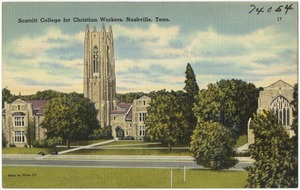On April 25, 1957, Dr. Martin Luther King, Jr. spoke in Wightman Chapel at Scarritt College to the Conference on Christian Faith and Human Relations. The Conference on Christian Faith and Human Relations was hosted by Scarritt College and Vanderbilt Divinity School and co-sponsored by the Tennessee Council of Churches and the Fellowship of Southern Churchmen (FSC). Organized in 1934 in Monteagle, Tennessee, the FSC was an interdenominational, interracial, group of southern church people interested in collectively addressing race relations, anti-Semitism, rural dependence, labor conditions, and other social issues through application of the Christian faith. Through workshops, conferences, and the like, the FSC brought together people of different backgrounds, many of them students, to promote human understanding and vocational discernment towards careers in religion and social justice.
The three-day conference explored the role of southern religious organizations in alleviating racial tensions and focused particularly on racial segregation in the South. Approximately three hundred ministers attended the conference, which featured addresses by Blake Smith, pastor of the integrated University Baptist Church in Austin, Texas, and Dr. Benjamin Mays of Morehouse College. Mays noted that, “The tragedy of the South is the lack of conviction to act…We know. We see. We have knowledge but we lack the spiritual insight and moral courage to act on the light that we have.” Integration within the church and the church’s relationship with the press were some of the topics addressed by speakers.
Dr. King spoke on the last day of the conference and addressed some 350 church leaders, the day after receiving the Social Justice Award from the Religion and Labor Foundation in New York. In his address, titled “The Role of the Church in Facing the Nation’s Chief Moral Dilemma,” Dr. King defined the nation’s dilemma as it’s failure “to make of our nation a brotherhood…racial segregation is a blatant detail of the unity which we have in Christ…the task of conquering segregation is an escapable must confronting the Christian churches. The churches are called upon to recognize the urgent necessity of taking a forthright stand on this crucial issue.” MLK then went on to list three reasons why his audience should look upon segregation as evil. These included the inherent inequality that segregationist policies perpetuate, the false superiority and inferiority internalized by whites and blacks respectively, and the dehumanization that segregationists impose upon those they view as less than them. King also made a call for leadership to both moderate white Southerners and black leaders alike, calling out that, “the salvation of the world lies in the hands of the maladjusted…the challenge to you is to be maladjusted to the evils of segregation…the madness of militarism and the self-defeating method of physical violence.”
Photo: Dr. Martin Luther King Jr., pastor of Dexter Ave. Baptist Church, Montgomery, Ala., minister who started the now-famous bus boycott in Montgomery last year, with Howard Kester, executive secretary of The Fellowship of Southern Churchmen, Black Mountain, N.C., and of the Conference on Christian Faith and Human Relations. Dr. King addressed the three-day session at University Center today. 1957. Photo by Jack Gunter. Courtesy of Nashville Banner archives at the Nashville Public Library.

